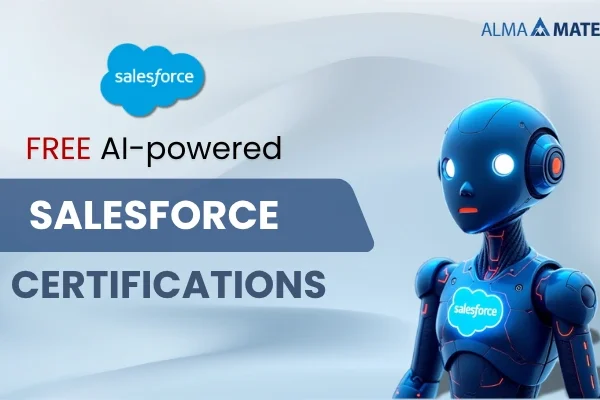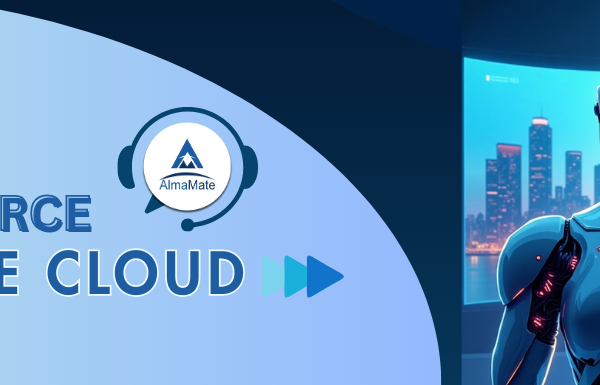As data generation continues to rise, businesses require a platform to effectively utilize their customer data and leverage the same to gain more insights. Salesforce stands out as a prominent CRM platform catering to this need. Used by a wide gamut of businesses such as SMEs, start-ups, MNCs, and Fortune 500 companies, Salesforce offers extensive tools and services.

What is Salesforce?
Salesforce, a leading American cloud-based software company, specializes in providing CRM services. It offers a suite of tools to businesses for prospecting, closing deals, and enhancing customer service. Widely adopted across support, sales, and marketing teams globally, Salesforce facilitates improved connectivity with partners, customers, and potential customers through its cloud-based services.
Salesforce services enable businesses to harness cloud technology for enhanced customer engagement, marketing, and other functionalities. Leveraging Salesforce CRM, companies can efficiently monitor customer activity, execute targeted marketing campaigns, and access a host of other services for streamlining business operations.
A CRM platform allows for an in-depth analysis of metrics and data, offering features such as customizable dashboards for visual data representation and automated personalized outreach. Moreover, it enhances customer service capabilities and streamlines sales team efforts, contributing to overall business efficiency.
What Does Salesforce Do?
Salesforce is a cloud-based Customer Relationship Management (CRM) platform, that empowers businesses to manage customer data, streamline sales operations, and execute targeted marketing campaigns. Through its diverse features and tools, Salesforce enables businesses to enhance customer relationships, segment customer data, and provide efficient customer support. Additionally, it offers seamless integrations with third-party applications, augmenting its versatility as a CRM platform.
How Does Salesforce Work?
Operating as both a CRM platform and a centralized system for managing customer accounts, sales leads, and support cases, Salesforce offers accessibility via web browsers, mobile apps, and desktop applications. Users can customize Salesforce by creating custom objects, fields, processes, and reports: integrating them with other software products. Furthermore, Salesforce incorporates marketing automation and Artificial Intelligence (AI) capabilities to enhance its functionality.
Salesforce and its CRM Background:
Salesforce aids businesses in tracking customer interactions and sales data, managing leads, contacts, opportunities, and cases. Its features facilitate the automation of sales and marketing processes, including email marketing, lead capture, and lead scoring. By utilizing CRM systems like Salesforce, businesses can enhance customer service and streamline sales operations effectively.
Salesforce Architecture:
The architecture of Salesforce comprises several layers, including:
- Multi-tenant architecture, which utilizes a single database schema to store data for multiple clients. This ensures cost-effectiveness.
- Metadata-driven development model, which simplifies customization and scalability by focusing on application building.
- Robust API support, which facilitates the development and customization of applications such as the Salesforce1 Mobile App.
Salesforce Infrastructure:
The backbone of Salesforce’s cloud computing platform, its infrastructure includes components like the application server, database server, development environment, and integration platform. Designed to be highly scalable and fault-tolerant, Salesforce Infrastructure undergoes continuous updates and enhancements to meet evolving business needs.
Salesforce Services:
Salesforce offers various services including:
- SAAS (Software As A Service): Offers built-in software directly to users.
- PAAS (Platform As A Service): Offers a framework and platform for website and application development.
- IAAS (Infrastructure As A Service): Supports Salesforce development, though less commonly utilized.
Salesforce Cloud Services:
Key Salesforce cloud services include:
- Sales Cloud: Facilitating CRM for sales, marketing, and customer support activities.
- Marketing Cloud: Enabling campaign management, email marketing, and data analytics.
- Analytics Cloud: Empowering users to create visually appealing data dashboards for in-depth analysis.
- IoT Cloud: Handling Internet of Things (IoT) data for real-time responses.
- App Cloud: Supporting custom app development on the Salesforce platform.
- Service Cloud: Offering service platform features like case tracking and social networking integration.
Salesforce Applications:
Salesforce applications cater to various needs including:
- Customer Service: Enhances customer support efficiency and issue resolution.
- Data Customization: Facilitates real-time analytics and customer experience enhancement.
- Flexible Reporting: Allows sales representatives to generate customized reports for account management.
- Customer Data Understanding: Provides insights into customer behavior and preferences for targeted marketing.
Why Use Salesforce?
Before delving into Salesforce’s specifics, understanding CRM is crucial. Initially managed manually or through MS Excel sheets, these methods proved inadequate for handling large volumes of data effectively. CRM solutions addressed this by digitizing data management, with Salesforce pioneering cloud-based CRM software delivery.
Benefits include enhanced time management, accessibility, increased revenue, greater customer satisfaction, simplified account planning, trusted reporting, and improved team collaboration.
Salesforce App-Exchange:
Salesforce App-Exchange serves as a marketplace offering a wide array of apps to extend Salesforce’s functionality. It provides customers with access to numerous applications tailored for enhancing their Salesforce instances.
Salesforce App Exchange Program:
The App Exchange Program is an enterprise-focused business app store, allowing customers to discover, test, and purchase trusted business applications for the Salesforce platform. With over 4,000 apps available, it offers solutions for various business needs.
What Made Salesforce an Instant Hit?
Launched in 1999, Salesforce revolutionized CRM software by delivering it over the Internet, eliminating the need for on-premises installations. Its cloud-based, browser-agnostic approach, along with a usage-based pricing model, appealed to businesses of all sizes. Additionally, Salesforce offered a wide range of features, responsive customer service, and was quick to integrate with other services, cementing its status as a leading CRM application.
- Marketing Cloud Account Engagement (Pardot): Pardot, or Marketing Cloud Account Engagement, empowers businesses to connect with customers meaningfully through targeted marketing campaigns and automated marketing tasks.
- Marketing Cloud Customer Data Platform (Customer 360 Audiences): The Customer Data Platform consolidates customer data from multiple sources, enabling targeted marketing campaigns for improved customer engagement and conversion rates.
- Marketing Cloud Advertising (Advertising Studio): Salesforce’s Advertising solution facilitates managing online advertising campaigns across various channels, offering insights for campaign optimization.
- Marketing Cloud Personalization (Interaction Studio): Interaction Studio enables personalized marketing messages and content delivery, enhancing customer engagement and conversion rates through tailored experiences.
- Marketing Cloud Intelligence (Datorama): Datorama provides a unified view of marketing data, aiding organizations in making informed decisions and optimizing marketing efforts for better results.
- Marketing Cloud Advanced Cross Channel: Advanced Cross Channel helps businesses reach customers across multiple channels, coordinating marketing efforts for maximum impact through targeted campaigns and detailed analytics.
- Salesforce Community Cloud: Community Cloud enables organizations to create and manage online communities tailored to their specific needs, fostering engagement among customers, partners, and employees.
- CRM Analytics (Tableau CRM): Tableau CRM empowers businesses to gain insights from customer data, track behavior, identify trends, and optimize marketing campaigns for improved results.
Salesforce Technologies:
Salesforce technologies, including Sales Cloud, Service Cloud, Marketing Cloud, and Commerce Cloud, are highly popular tools for managing customer relationships, sales operations, and marketing campaigns. Cloud-based and customizable, they offer accessibility and flexibility to businesses of all sizes, constantly evolving to provide the latest features and capabilities.
How Does Salesforce Pervade Itself in Various Areas?
Salesforce pervades various domains including CRM, cloud computing, analytics, e-commerce, AI, and IoT, offering comprehensive tools for managing customer data, automating processes, analyzing insights, and creating personalized experiences. Its user-friendly platform and extensive integrations make it a preferred choice for businesses seeking efficient solutions across diverse areas.
Salesforce Use Cases:
Salesforce serves several use cases, including automating sales processes, tracking and scoring leads, managing customer relationships, and generating reports and analytics for informed decision-making. Its versatility and functionality address critical business needs, enhancing efficiency and productivity across various operations.















